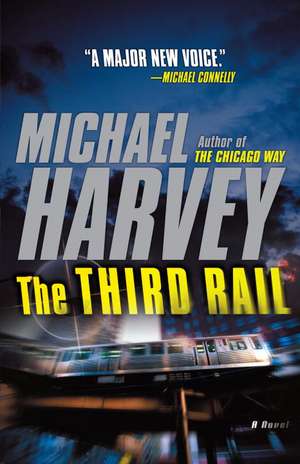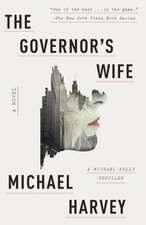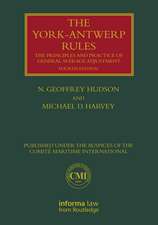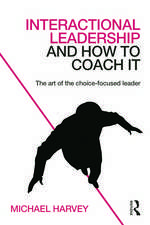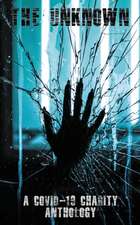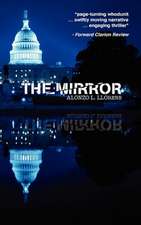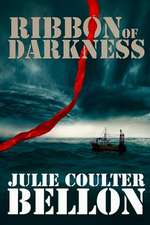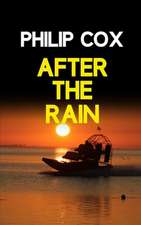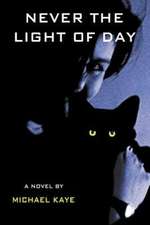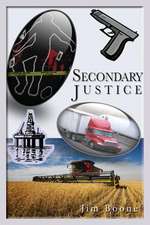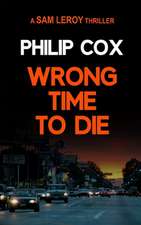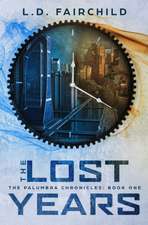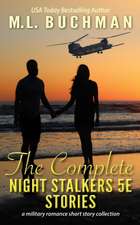The Third Rail: Vintage Crime/Black Lizard
Autor Michael Harveyen Limba Engleză Paperback – 28 feb 2011
Kelly is initially drawn into the case by the killers themselves, then tasked by Chicago’s mayor and the FBI to hunt down the bad guys and, all things being equal, put a bullet in them. Kelly, of course, has other ideas. As he gets closer to the truth, his instincts lead him to a retired cop, a shady train company, and an unnerving link to his own past. Meanwhile, Kelly’s girlfriend, Rachel Swenson, becomes a pawn in a much larger game, while a weapon that could kill millions ticks away quietly in the very belly of the city.
The Third Rail is stylish, sophisticated, edge-of-your-seat suspense from a new modern master.
| Toate formatele și edițiile | Preț | Express |
|---|---|---|
| Paperback (2) | 39.54 lei 6-8 săpt. | |
| Vintage Crime/Black Lizard – 28 feb 2011 | 101.58 lei 3-5 săpt. | |
| Bloomsbury Publishing – 2 mai 2011 | 39.54 lei 6-8 săpt. |
Din seria Vintage Crime/Black Lizard
-
 Preț: 96.74 lei
Preț: 96.74 lei -
 Preț: 100.98 lei
Preț: 100.98 lei -
 Preț: 116.64 lei
Preț: 116.64 lei -
 Preț: 100.57 lei
Preț: 100.57 lei -
 Preț: 101.58 lei
Preț: 101.58 lei -
 Preț: 104.39 lei
Preț: 104.39 lei -
 Preț: 100.76 lei
Preț: 100.76 lei -
 Preț: 106.23 lei
Preț: 106.23 lei -
 Preț: 103.44 lei
Preț: 103.44 lei -
 Preț: 101.58 lei
Preț: 101.58 lei -
 Preț: 81.06 lei
Preț: 81.06 lei -
 Preț: 100.35 lei
Preț: 100.35 lei -
 Preț: 80.41 lei
Preț: 80.41 lei -
 Preț: 128.00 lei
Preț: 128.00 lei -
 Preț: 95.51 lei
Preț: 95.51 lei -
 Preț: 107.68 lei
Preț: 107.68 lei -
 Preț: 123.57 lei
Preț: 123.57 lei -
 Preț: 109.71 lei
Preț: 109.71 lei -
 Preț: 95.10 lei
Preț: 95.10 lei -
 Preț: 113.56 lei
Preț: 113.56 lei -
 Preț: 91.27 lei
Preț: 91.27 lei -
 Preț: 114.69 lei
Preț: 114.69 lei -
 Preț: 92.74 lei
Preț: 92.74 lei -
 Preț: 86.61 lei
Preț: 86.61 lei -
 Preț: 106.64 lei
Preț: 106.64 lei -
 Preț: 98.78 lei
Preț: 98.78 lei -
 Preț: 101.17 lei
Preț: 101.17 lei -
 Preț: 94.35 lei
Preț: 94.35 lei -
 Preț: 102.70 lei
Preț: 102.70 lei -
 Preț: 91.05 lei
Preț: 91.05 lei -
 Preț: 97.34 lei
Preț: 97.34 lei -
 Preț: 111.58 lei
Preț: 111.58 lei -
 Preț: 121.82 lei
Preț: 121.82 lei -
 Preț: 96.11 lei
Preț: 96.11 lei -
 Preț: 96.33 lei
Preț: 96.33 lei -
 Preț: 104.48 lei
Preț: 104.48 lei -
 Preț: 112.97 lei
Preț: 112.97 lei -
 Preț: 99.94 lei
Preț: 99.94 lei -
 Preț: 111.58 lei
Preț: 111.58 lei -
 Preț: 102.40 lei
Preț: 102.40 lei -
 Preț: 106.45 lei
Preț: 106.45 lei -
 Preț: 100.57 lei
Preț: 100.57 lei -
 Preț: 94.06 lei
Preț: 94.06 lei -
 Preț: 69.75 lei
Preț: 69.75 lei -
 Preț: 98.15 lei
Preț: 98.15 lei -
 Preț: 101.39 lei
Preț: 101.39 lei -
 Preț: 109.49 lei
Preț: 109.49 lei -
 Preț: 95.51 lei
Preț: 95.51 lei -
 Preț: 93.22 lei
Preț: 93.22 lei
Preț: 101.58 lei
Nou
Puncte Express: 152
Preț estimativ în valută:
19.44€ • 20.35$ • 16.08£
19.44€ • 20.35$ • 16.08£
Carte disponibilă
Livrare economică 15-29 martie
Preluare comenzi: 021 569.72.76
Specificații
ISBN-13: 9780307946584
ISBN-10: 0307946584
Pagini: 304
Dimensiuni: 134 x 202 x 18 mm
Greutate: 0.23 kg
Editura: Vintage Crime/Black Lizard
Seria Vintage Crime/Black Lizard
ISBN-10: 0307946584
Pagini: 304
Dimensiuni: 134 x 202 x 18 mm
Greutate: 0.23 kg
Editura: Vintage Crime/Black Lizard
Seria Vintage Crime/Black Lizard
Notă biografică
Michael Harvey is the author of The Chicago Way and The Fifth Floor, and is also a journalist and documentary producer. His work has won numerous national and international awards, including multiple Emmy Awards, two Primetime Emmy nominations, and an Academy Award nomination. He holds a law degree from Duke University, a master’s degree in journalism from Northwestern University, and a bachelor’s degree in classical languages from Holy Cross College.
www.michaelharvey.com
www.michaelharvey.com
Extras
Chapter 1
Robles had been on the platform for less than twenty seconds. He leaned against the railing and peered through layered curtains of snow, at the stone faces of apartment buildings crowding close to Chicago’s elevated tracks. The row of windows across from him was dark. The street below, quiet. Robles turned back toward the crowd waiting for the train. To his left stood a secretary type, keeping Chicago’s winter at bay with a heavy brown coat that ran to her knees. Beside her was a guy barely out of law school, toting a briefcase that was barely out of the box. A clock wound down inside Robles’ head. Fifteen more seconds and he needed to move. He gripped the gun in his pocket and walked back toward the entrance to the L platform. A dark-eyed woman was putting on lipstick and standing by the stairs. Her bad luck. He moved closer and snuck a look down the stairwell. No one coming up. More bad luck for her. Robles pulled the gun from his pocket and held it straight in front of him. He focused on the blue pulse beating tiny wings inside the woman’s left temple. Then he pulled the trigger, and the woman dropped straight down. Like a puppet with the strings cut, she was all here and there, arms, legs, and a smear of lipstick across her lips and down her chin. She gurgled once or twice and might have even gotten a look at him before the darkness dropped across her eyes. Ten seconds later, Robles was back on the street. He didn’t run until he got to the corner and, even then, not too fast. He didn’t want to attract attention. More important, he didn’t want to get too far ahead of the man he hoped would pursue.
Chapter 2
I took the stairs two at a time, slid over the turnstile and out of the L station. A kick of wind hit me fat in the face, and snow fell sideways as I shouldered my way down Southport Avenue. A soft frat boy and his softer girlfriend stood stiff at the corner of Southport and Cornelia, wearing Northwestern and Notre Dame sweatshirts, respectively, and pointing their slack jaws and wide eyes east. Even if I weren’t a detective, it wasn’t hard to figure which way the shooter had run. I pulled my nine millimeter, held it low by my side, and turned down Cornelia. A half block ahead, a slip of dark fabric disappeared into an alley. I followed, past a run of single-family homes, two- and three-flats, a block from Chicago’s Brown Line. At the mouth of the alley, I leaned up against a graystone and took a quick look around the corner. The run of pavement was empty, save for a string of Dumpsters and a rat the size of a cat that, thankfully, took off for points unknown. I slowed my breathing and listened. The wind had died and the fall of new snow deadened everything, including the footsteps of the guy who had just shot a woman on the platform of the Southport L. I crept up to the first Dumpster. A scuff of fresh powder told me my guy had turned in to a second alley that snaked off the first, running parallel to Cornelia. I pulled my gun up to shoulder height and crept forward again. More footprints in the second alley, chalked in white and headed east. Whoever he was, he had turned the corner and just kept moving. I slipped my gun back into its holster and took off at a run. I had made it a good ten yards before a body flew up from behind and to my left. I sprawled toward the dusting of snow and hard cement underneath. He kept his body weight balanced and center of gravity low. I tried to shift, but he slipped an arm across the back of my neck and ground my head against the pavement. I relaxed for a second, hoping my guy might as well. Then I felt steel pressed against the base of my skull and stopped moving altogether. A gun will do that to you.
“Easy,” the man said and backed off the pressure on his forearm a little. The gun stayed where it was. “Turn around.”
I turned my head just enough. The shooter wore a black overcoat with black buttons. A fine spray of liquid clung to the hem of his coat. Blood splatter from the woman as she fell. I looked up. He had a black stocking hat on. A ski mask covered his face. I took all that in even as my brain processed the final piece of the puzzle, the dark hole of a .40-caliber handgun, sitting six inches from my forehead.
“Ready to die, hero?” He said it more like he was curious than anything else. Really, genuinely interested in my comfort level with impending mortality. I figured anything I might say would just kick off the festivities. So I didn’t say anything. Just looked at the mask and tried to fathom the face beyond. He lifted the gun a fraction and began to pull back on the trigger. You might think you can’t see that kind of delicate pressure on a trigger. Trust me, when you’re up that close and personal, you notice. So he squeezed back, a pound or two of pressure. Then he stopped, lifted the gun another inch or so, and brought it down, fast, heavy, and hard. After that, it was the rush of Chicago asphalt toward my face and darkness.
Chapter 3
Robles was two miles and thirty minutes removed from the Southport L stop. He’d changed into an oversize sweatshirt with a Nike logo on the front and black slashes down the sleeves. He had the hood pulled low over his eyes and stared out a window as the number 136 bus pulled onto Lake Shore Drive for its journey downtown. The snow had stopped as quickly as it started, and the winter sun poured cold light over the city. A woman in a Honda Civic cruised close. She had a cell phone cradled at one ear and fussed in the rearview mirror with the corners of her mouth. Robles watched as her front wheel wandered to the edge of her lane and past, brushing close to the side of the bus. His driver laid on the horn. The woman took her eyes off herself, pulled her car straight, and flipped a middle finger toward anyone and everyone who ever rode the CTA. Then she snapped the cell shut and went back to her face.
Robles felt the anger, hot and uncomfortable inside, but tamped it down. He pulled out a street map of Chicago and took a look at the Loop. He knew the block and traced the route with his finger for what seemed like the hundredth time. He liked to run things through his mind. That way, when it came time to act, there’d be no thinking. Just hit the button, play the tape, and follow along.
Robles stood as the bus turned onto Wacker, walked to the back door, and reached for the grab bar overhead. An old lady sat nearby, tapping her foot and cursing softly under her breath. At first, Robles thought the “motherfucker”s were for him; then he realized she was just another nut job riding the CTA. Robles smiled at the old lady and pictured himself cutting her throat. She looked up, tapped her foot again, and called him a cocksucker. At the front of the bus a radio crackled. The driver picked up his two-way and listened, then asked a question Robles couldn’t quite make out. Didn’t matter. He had a feeling he knew exactly what all the chatter was about and pulled the cord to request a stop.
The bus angled to the curb at Wacker, on the edge of Chicago’s Loop. Robles got off and walked south on Wabash to the corner of Lake. The building was about four or five stories high, cut rough from blocks of Indiana limestone and black with soot from the big city’s breath. He pulled on a pair of gloves and stepped inside the front door. There was no one in the vestibule, just a line of metal mailboxes and a set of wooden stairs, sinking to the right and winding up. Robles took the stairs, two at a time, until he got to the top floor, turned a corner, and walked to the end of a hall that was long, narrow, and smelled like old diapers. There was a small window at the end, letting in a sad trickle of light onto a wooden door with a silver doorknob. The key was taped under a corner of the synthetic orange carpet, just to the left of the door. Robles turned the lock and walked in.
It was a one-room apartment with a single light in the middle of the room and a second door that probably led to a bathroom. Directly in front of him was a set of three more windows. Larger than the one in the hall, they looked south, out over a landscape of smoke and steel. In the foreground was a curve of green girders and the Loop’s elevated tracks, wrapping around the corner at Lake and Wabash.
Robles opened one of the windows and leaned into a cold draft circling up from the street. A pigeon hopped onto a ledge below him and stared. Robles ducked his head back inside and drew a shade across each of the windows. Then he walked over to a white sheet, spread out on the floor in the middle of the room. Under the sheet was a gray gun case. Inside the case, a Remington 700 rifle with a Leupold scope and a box of .308 Winchester ammo. Robles took out the weapon and broke it down. A train rumbled by, rattling the windows in their frames and vibrating the boards under his feet. Robles smiled. They hadn’t stopped the downtown runs. Even after the thing at Southport. He didn’t think they would. No need. Not yet, anyway.
Twenty minutes later, Robles had reassembled the rifle and loaded a five-round magazine. He spread out a floor pad by the windows, cracked the middle shade to half-mast, and opened the window itself six inches. Four trains had passed since he’d entered the apartment, about one every five minutes. On the sill in front of him was a CTA train schedule. There’d be another in a minute and a half. Robles slipped the barrel out the window and looked through the scope. It was blurry, so he adjusted, using a billboard asking Chicago to support their Bulls as a marker. Derrick Rose’s face popped up in the sight. Another adjustment, and Chicago’s savior sharpened into focus. Robles heard a rumble as a train approached the curve of track. His train. Right on time. Robles slipped his finger onto the trigger and leaned into the rifle stock. Then he pulled his head back and listened. The scratching at the door was soft, but close and very much there. He waited, hoped whoever it was might go away. The knocking, however, persisted, grew louder, and Robles knew it was fated to be so.
He placed the gun back in its case and covered it over with the sheet. Then he closed the shade, slipped off his gloves, and opened the door just as the train rushed by. On the other side was an old face, hammered down between two shoulders and pinched with anger at a life that had somehow wound up here. Robles cared not a bit for any of that. The face was in the way. The face needed to go away.
“Sorry,” Robles said. “I was in the can. You need something?”
“Name’s Jim Halter. I manage the place.”
Halter’s smile revealed a row of large teeth that looked like unwashed elbows. His eyes were black and busy, slipping over the threshold and into the room, hungry for whatever there was to be had: a young girl, a stash of drugs, maybe a whiff of cash. Robles angled his body to give the building’s manager a better look.
“Nice to meet you, Jim. You want to come in for a second?”
Halter raised a long, veined hand to his face. The nails were calcified, the skin, spotted.
“No, no,” Halter said as he stepped across the threshold. “I just wanted to check in. Make sure you got settled okay.”
“Sure.” Robles swung the door shut.
Halter took a quick look behind him and might have been a little spooked. Then he noticed the white sheet in the middle of the room. The slippery eyes widened a bit more and a tongue moistened lips the color of liver.
“The e-mail said you’d be in today,” Halter said. “I was a little leery of leaving a key. But I guess it worked out all right.”
Robles showed him the key. “Worked out fine. Thanks.”
Halter nodded and took a second step into the room. Robles crowded close behind. The manager’s Adam’s apple rolled in its pocket of flesh, and Robles slid the room key back into his pocket.
“What sort of business you in, sir? If you don’t mind me asking, that is?”
Halter created space as he spoke, fluttering, like an old and desiccated moth, to whatever sliver of flame lay underneath that magic sheet. Robles let him drift, fitting a six-inch hunting knife to his hand and feeling a familiar hole at the back of his throat. Wet work, Nelson called it. Robles took a calming breath. Wet work it would be.
“Reason I ask,” Halter said, “I have a lot of expertise. Connections in the area.”
“You do?”
“Sure.” The manager began to turn back toward Robles, eager to strike his bargain. Eager to discover what lay hidden. Eager for his piece.
The manager made it, maybe, halfway. Robles grabbed him under the chin and stretched his neck. The cut was clean. Halter collapsed in a rush of air, the wound making a sucking sound like he was trying to breathe through his throat. Robles stepped back. The manager slipped the rest of the way to the floor and lay there, wet, red, and shivering. A soft moan followed and a roll of eyes across the room.
“Shit.” Robles took another step back. Halter was bleeding hard, the body in spasm, but well on its way to dead. Robles used the sheet to cover him over. Within a minute or so, the shivering had stopped and the white cotton ran crimson. Robles wiped his blade clean on the sheet and took a quick inventory. He had a smear of blood on his pants and some on his shoes. He cleaned them as best he could. Then he wiped down the doorknob and door. It would have to do.
Robles checked his watch. The whole thing had taken less than five minutes. Not a problem. He slipped his gloves back on, picked up the rifle, and headed back to the windows. He arranged the floor pad again and sat, rifle cradled in his lap. Then he closed his eyes and waited for his pulse to slow. After a minute or so, he opened his eyes, took a deep breath and long exhale. He felt good again, back in the moment. Robles raised the middle shade and reseated the rifle so the barrel was sticking three inches outside the window. He’d been half expecting something like Halter and was glad it was over. Now he fixed his eye again to the scope, scanned the tracks, and waited.
From the Hardcover edition.
Robles had been on the platform for less than twenty seconds. He leaned against the railing and peered through layered curtains of snow, at the stone faces of apartment buildings crowding close to Chicago’s elevated tracks. The row of windows across from him was dark. The street below, quiet. Robles turned back toward the crowd waiting for the train. To his left stood a secretary type, keeping Chicago’s winter at bay with a heavy brown coat that ran to her knees. Beside her was a guy barely out of law school, toting a briefcase that was barely out of the box. A clock wound down inside Robles’ head. Fifteen more seconds and he needed to move. He gripped the gun in his pocket and walked back toward the entrance to the L platform. A dark-eyed woman was putting on lipstick and standing by the stairs. Her bad luck. He moved closer and snuck a look down the stairwell. No one coming up. More bad luck for her. Robles pulled the gun from his pocket and held it straight in front of him. He focused on the blue pulse beating tiny wings inside the woman’s left temple. Then he pulled the trigger, and the woman dropped straight down. Like a puppet with the strings cut, she was all here and there, arms, legs, and a smear of lipstick across her lips and down her chin. She gurgled once or twice and might have even gotten a look at him before the darkness dropped across her eyes. Ten seconds later, Robles was back on the street. He didn’t run until he got to the corner and, even then, not too fast. He didn’t want to attract attention. More important, he didn’t want to get too far ahead of the man he hoped would pursue.
Chapter 2
I took the stairs two at a time, slid over the turnstile and out of the L station. A kick of wind hit me fat in the face, and snow fell sideways as I shouldered my way down Southport Avenue. A soft frat boy and his softer girlfriend stood stiff at the corner of Southport and Cornelia, wearing Northwestern and Notre Dame sweatshirts, respectively, and pointing their slack jaws and wide eyes east. Even if I weren’t a detective, it wasn’t hard to figure which way the shooter had run. I pulled my nine millimeter, held it low by my side, and turned down Cornelia. A half block ahead, a slip of dark fabric disappeared into an alley. I followed, past a run of single-family homes, two- and three-flats, a block from Chicago’s Brown Line. At the mouth of the alley, I leaned up against a graystone and took a quick look around the corner. The run of pavement was empty, save for a string of Dumpsters and a rat the size of a cat that, thankfully, took off for points unknown. I slowed my breathing and listened. The wind had died and the fall of new snow deadened everything, including the footsteps of the guy who had just shot a woman on the platform of the Southport L. I crept up to the first Dumpster. A scuff of fresh powder told me my guy had turned in to a second alley that snaked off the first, running parallel to Cornelia. I pulled my gun up to shoulder height and crept forward again. More footprints in the second alley, chalked in white and headed east. Whoever he was, he had turned the corner and just kept moving. I slipped my gun back into its holster and took off at a run. I had made it a good ten yards before a body flew up from behind and to my left. I sprawled toward the dusting of snow and hard cement underneath. He kept his body weight balanced and center of gravity low. I tried to shift, but he slipped an arm across the back of my neck and ground my head against the pavement. I relaxed for a second, hoping my guy might as well. Then I felt steel pressed against the base of my skull and stopped moving altogether. A gun will do that to you.
“Easy,” the man said and backed off the pressure on his forearm a little. The gun stayed where it was. “Turn around.”
I turned my head just enough. The shooter wore a black overcoat with black buttons. A fine spray of liquid clung to the hem of his coat. Blood splatter from the woman as she fell. I looked up. He had a black stocking hat on. A ski mask covered his face. I took all that in even as my brain processed the final piece of the puzzle, the dark hole of a .40-caliber handgun, sitting six inches from my forehead.
“Ready to die, hero?” He said it more like he was curious than anything else. Really, genuinely interested in my comfort level with impending mortality. I figured anything I might say would just kick off the festivities. So I didn’t say anything. Just looked at the mask and tried to fathom the face beyond. He lifted the gun a fraction and began to pull back on the trigger. You might think you can’t see that kind of delicate pressure on a trigger. Trust me, when you’re up that close and personal, you notice. So he squeezed back, a pound or two of pressure. Then he stopped, lifted the gun another inch or so, and brought it down, fast, heavy, and hard. After that, it was the rush of Chicago asphalt toward my face and darkness.
Chapter 3
Robles was two miles and thirty minutes removed from the Southport L stop. He’d changed into an oversize sweatshirt with a Nike logo on the front and black slashes down the sleeves. He had the hood pulled low over his eyes and stared out a window as the number 136 bus pulled onto Lake Shore Drive for its journey downtown. The snow had stopped as quickly as it started, and the winter sun poured cold light over the city. A woman in a Honda Civic cruised close. She had a cell phone cradled at one ear and fussed in the rearview mirror with the corners of her mouth. Robles watched as her front wheel wandered to the edge of her lane and past, brushing close to the side of the bus. His driver laid on the horn. The woman took her eyes off herself, pulled her car straight, and flipped a middle finger toward anyone and everyone who ever rode the CTA. Then she snapped the cell shut and went back to her face.
Robles felt the anger, hot and uncomfortable inside, but tamped it down. He pulled out a street map of Chicago and took a look at the Loop. He knew the block and traced the route with his finger for what seemed like the hundredth time. He liked to run things through his mind. That way, when it came time to act, there’d be no thinking. Just hit the button, play the tape, and follow along.
Robles stood as the bus turned onto Wacker, walked to the back door, and reached for the grab bar overhead. An old lady sat nearby, tapping her foot and cursing softly under her breath. At first, Robles thought the “motherfucker”s were for him; then he realized she was just another nut job riding the CTA. Robles smiled at the old lady and pictured himself cutting her throat. She looked up, tapped her foot again, and called him a cocksucker. At the front of the bus a radio crackled. The driver picked up his two-way and listened, then asked a question Robles couldn’t quite make out. Didn’t matter. He had a feeling he knew exactly what all the chatter was about and pulled the cord to request a stop.
The bus angled to the curb at Wacker, on the edge of Chicago’s Loop. Robles got off and walked south on Wabash to the corner of Lake. The building was about four or five stories high, cut rough from blocks of Indiana limestone and black with soot from the big city’s breath. He pulled on a pair of gloves and stepped inside the front door. There was no one in the vestibule, just a line of metal mailboxes and a set of wooden stairs, sinking to the right and winding up. Robles took the stairs, two at a time, until he got to the top floor, turned a corner, and walked to the end of a hall that was long, narrow, and smelled like old diapers. There was a small window at the end, letting in a sad trickle of light onto a wooden door with a silver doorknob. The key was taped under a corner of the synthetic orange carpet, just to the left of the door. Robles turned the lock and walked in.
It was a one-room apartment with a single light in the middle of the room and a second door that probably led to a bathroom. Directly in front of him was a set of three more windows. Larger than the one in the hall, they looked south, out over a landscape of smoke and steel. In the foreground was a curve of green girders and the Loop’s elevated tracks, wrapping around the corner at Lake and Wabash.
Robles opened one of the windows and leaned into a cold draft circling up from the street. A pigeon hopped onto a ledge below him and stared. Robles ducked his head back inside and drew a shade across each of the windows. Then he walked over to a white sheet, spread out on the floor in the middle of the room. Under the sheet was a gray gun case. Inside the case, a Remington 700 rifle with a Leupold scope and a box of .308 Winchester ammo. Robles took out the weapon and broke it down. A train rumbled by, rattling the windows in their frames and vibrating the boards under his feet. Robles smiled. They hadn’t stopped the downtown runs. Even after the thing at Southport. He didn’t think they would. No need. Not yet, anyway.
Twenty minutes later, Robles had reassembled the rifle and loaded a five-round magazine. He spread out a floor pad by the windows, cracked the middle shade to half-mast, and opened the window itself six inches. Four trains had passed since he’d entered the apartment, about one every five minutes. On the sill in front of him was a CTA train schedule. There’d be another in a minute and a half. Robles slipped the barrel out the window and looked through the scope. It was blurry, so he adjusted, using a billboard asking Chicago to support their Bulls as a marker. Derrick Rose’s face popped up in the sight. Another adjustment, and Chicago’s savior sharpened into focus. Robles heard a rumble as a train approached the curve of track. His train. Right on time. Robles slipped his finger onto the trigger and leaned into the rifle stock. Then he pulled his head back and listened. The scratching at the door was soft, but close and very much there. He waited, hoped whoever it was might go away. The knocking, however, persisted, grew louder, and Robles knew it was fated to be so.
He placed the gun back in its case and covered it over with the sheet. Then he closed the shade, slipped off his gloves, and opened the door just as the train rushed by. On the other side was an old face, hammered down between two shoulders and pinched with anger at a life that had somehow wound up here. Robles cared not a bit for any of that. The face was in the way. The face needed to go away.
“Sorry,” Robles said. “I was in the can. You need something?”
“Name’s Jim Halter. I manage the place.”
Halter’s smile revealed a row of large teeth that looked like unwashed elbows. His eyes were black and busy, slipping over the threshold and into the room, hungry for whatever there was to be had: a young girl, a stash of drugs, maybe a whiff of cash. Robles angled his body to give the building’s manager a better look.
“Nice to meet you, Jim. You want to come in for a second?”
Halter raised a long, veined hand to his face. The nails were calcified, the skin, spotted.
“No, no,” Halter said as he stepped across the threshold. “I just wanted to check in. Make sure you got settled okay.”
“Sure.” Robles swung the door shut.
Halter took a quick look behind him and might have been a little spooked. Then he noticed the white sheet in the middle of the room. The slippery eyes widened a bit more and a tongue moistened lips the color of liver.
“The e-mail said you’d be in today,” Halter said. “I was a little leery of leaving a key. But I guess it worked out all right.”
Robles showed him the key. “Worked out fine. Thanks.”
Halter nodded and took a second step into the room. Robles crowded close behind. The manager’s Adam’s apple rolled in its pocket of flesh, and Robles slid the room key back into his pocket.
“What sort of business you in, sir? If you don’t mind me asking, that is?”
Halter created space as he spoke, fluttering, like an old and desiccated moth, to whatever sliver of flame lay underneath that magic sheet. Robles let him drift, fitting a six-inch hunting knife to his hand and feeling a familiar hole at the back of his throat. Wet work, Nelson called it. Robles took a calming breath. Wet work it would be.
“Reason I ask,” Halter said, “I have a lot of expertise. Connections in the area.”
“You do?”
“Sure.” The manager began to turn back toward Robles, eager to strike his bargain. Eager to discover what lay hidden. Eager for his piece.
The manager made it, maybe, halfway. Robles grabbed him under the chin and stretched his neck. The cut was clean. Halter collapsed in a rush of air, the wound making a sucking sound like he was trying to breathe through his throat. Robles stepped back. The manager slipped the rest of the way to the floor and lay there, wet, red, and shivering. A soft moan followed and a roll of eyes across the room.
“Shit.” Robles took another step back. Halter was bleeding hard, the body in spasm, but well on its way to dead. Robles used the sheet to cover him over. Within a minute or so, the shivering had stopped and the white cotton ran crimson. Robles wiped his blade clean on the sheet and took a quick inventory. He had a smear of blood on his pants and some on his shoes. He cleaned them as best he could. Then he wiped down the doorknob and door. It would have to do.
Robles checked his watch. The whole thing had taken less than five minutes. Not a problem. He slipped his gloves back on, picked up the rifle, and headed back to the windows. He arranged the floor pad again and sat, rifle cradled in his lap. Then he closed his eyes and waited for his pulse to slow. After a minute or so, he opened his eyes, took a deep breath and long exhale. He felt good again, back in the moment. Robles raised the middle shade and reseated the rifle so the barrel was sticking three inches outside the window. He’d been half expecting something like Halter and was glad it was over. Now he fixed his eye again to the scope, scanned the tracks, and waited.
From the Hardcover edition.
Recenzii
Praise for Michael Harvey’s The Third Rail
“[A] knockout thriller. . . . Harvey dispenses the pressure plays, cruel surprises and heartbreaking setbacks of his plot with crack timing, never allowing the reader a moment to unfasten his seat belt. And all the while Harvey renders [P. I. Michael] Kelly’s Chicago in crisp, tough and ironic prose.”
—Gerald Bartell, The Washington Post Book World
“Michael Harvey should be read by all.”
—John Grisham
“[A] stellar third novel. . . . Harvey stakes a persuasive claim as the preeminent contemporary voice of Chicago noir.”
—Publishers Weekly (starred review)
“[A] book-length jolt of pure adrenaline.”
—Kirkus
“The expert use of Chicago politics that distinguished Harvey’s previous novel, The Fifth Floor, is much in evidence here as well. . . . [T]he action is nonstop, Harvey once again captures the unique zeitgeist of the city, and Kelly, tough, smart, and a bit rough around the edges, is a true native son.”
—Thomas Gaughan, Booklist
“Harvey drives his third Michael Kelly entry (after The Fifth Floor) like an efficient train. . . . The mixture of high-speed drama and historical elements showcases the author’s journalist roots. It comes off like a juicy true-crime story with abundant twists, ensuring that the reader is left feeling unbalanced most of the time. Harvey shares his passion for Chicago, much like Gabriel Cohen does with his Brooklyn crime novels.”
—Teresa L. Jacobsen, Library Journal
Praise for The Fifth Floor
“In The Fifth Floor, Michael Harvey gives us a tale of murder, bare-knuckle mayoral politics, and historical catastropheߝin short, the perfect Chicago detective story, complete with a loving tour of the city’s funkier locales that’ll make any displaced Chicagoan long for home.”
—Erik Larson, author of The Devil In the White City
“Michael Harvey has done for Chicago what Raymond Chandler did for Los Angeles and Dashiell Hammett for San Francisco. . . . Dazzlingly good.”
—Les Roberts, The Plain Dealer
“This is a first-rate detective novel that brings back the glory of those earlier heroes, but with the appeal of today’s modern world. They don’t come much better than this one.”
—The Journal Star
“Harvey is a budding superstar.”
—The Daily News
“Impressive . . . a tangled, fascinating tale.”
—The Chicago Tribune
“A sophisticated caper that keeps readers guessing. . . . Rapt attention is necessary to keep track of the plot twists and characters, but Harvey brilliantly brings all the threads together, and provides a satisfying conclusion.”
—The Missourian
Praise for The Chicago Way
“A magnificent debut that should be read by all.”
—John Grisham
“Harvey’s debut delivers a fast-paced thrill ride through Chicago’s seedy underbelly . . . [He] masterfully combines the sardonic wit of Chandler with the gritty violence of Lehane’s Kenzie and Gennaro series. Bringing Chicago to life so skillfully that the reader can almost hear the El train in the distance, Harvey is poised to take the crime-writing world by storm.”
—Publishers Weekly (starred review)
“Heartfelt, ambitious . . . Kelly, a wisecracking Irish Scrapper, slings metaphors like Philip Marlowe and reads Homer and Aeschylus in Greek . . . Harvey ends up delivering the goods.”
—Kirkus
“Michael Harvey’s tightly plotted evocation of the Chicago underworld is set in the present but brings to mind the voices of Chandler and Hammett.”
—New York
“Gritty and witty, The Chicago Way is done the classic Raymond Chandler Way. Harvey’s taut plot, snappy prose, and memorable characters make this debut novel a real winner.”
—Kathy Reichs
“The Chicago Way is a wonderful first novel. Michael Harvey has studied the masters and put his own unique touch on the crime novel. This book harkens the arrival of a major new voice.”
—Michael Connelly
“An intricate, fast-paced crime thriller.”
—Chicago Sun-Times
“The efficiency of [Harvey’s] cinematic style . . . suits the brisk, animated shots of Chicago that give the story both grit and authenticity.”
—New York Times Book Review
“It is a measure of the ambition of Michael Harvey’s first novel, The Chicago Way, that we start it thinking about Dashiell Hammett and end it pondering Aeschylus.”
—The Washington Post Book World
“A smart, stylish debut . . . fresh. . . . The dialogue is snappy and crisp and the characters pop off the page. The plot flows along swimmingly with plenty of surprises.”
—The Boston Globe
“Not to be outdone by his work in television, Harvey has written a provocative novel that captures the grittiness of the Windy City and spins a murder mystery with a satisfying and out-of-left-field ending. . . . Readers will find the clipped cadence of Harvey’s dialogue and narrative wonderfully reminiscent of Raymond Chandler.”
—USA Today
“[Harvey] composes punchy noir sentences that he stacks into punchy noir paragraphs that have all the rhythm, irony, and wit of the genre’s manly classics of the 1920s and ’30s.”
—Jennifer Reese, Entertainment Weekly
“The opening pages are packed with the kind of wry, dry narration that goes down as smoothly as a pulp paperback with a shot of rye. . . . A twisty page-turner.”
—Booklist
“This contemporary police procedural by the man responsible for TV’s Cold Case Files smacks of Raymond Chandler filtered through Robert B. Parker.”
—Go Magazine
“The Chicago Way by Michael Harvey is as entertaining as a night out on the town.”
—The Missourian
“[A] knockout thriller. . . . Harvey dispenses the pressure plays, cruel surprises and heartbreaking setbacks of his plot with crack timing, never allowing the reader a moment to unfasten his seat belt. And all the while Harvey renders [P. I. Michael] Kelly’s Chicago in crisp, tough and ironic prose.”
—Gerald Bartell, The Washington Post Book World
“Michael Harvey should be read by all.”
—John Grisham
“[A] stellar third novel. . . . Harvey stakes a persuasive claim as the preeminent contemporary voice of Chicago noir.”
—Publishers Weekly (starred review)
“[A] book-length jolt of pure adrenaline.”
—Kirkus
“The expert use of Chicago politics that distinguished Harvey’s previous novel, The Fifth Floor, is much in evidence here as well. . . . [T]he action is nonstop, Harvey once again captures the unique zeitgeist of the city, and Kelly, tough, smart, and a bit rough around the edges, is a true native son.”
—Thomas Gaughan, Booklist
“Harvey drives his third Michael Kelly entry (after The Fifth Floor) like an efficient train. . . . The mixture of high-speed drama and historical elements showcases the author’s journalist roots. It comes off like a juicy true-crime story with abundant twists, ensuring that the reader is left feeling unbalanced most of the time. Harvey shares his passion for Chicago, much like Gabriel Cohen does with his Brooklyn crime novels.”
—Teresa L. Jacobsen, Library Journal
Praise for The Fifth Floor
“In The Fifth Floor, Michael Harvey gives us a tale of murder, bare-knuckle mayoral politics, and historical catastropheߝin short, the perfect Chicago detective story, complete with a loving tour of the city’s funkier locales that’ll make any displaced Chicagoan long for home.”
—Erik Larson, author of The Devil In the White City
“Michael Harvey has done for Chicago what Raymond Chandler did for Los Angeles and Dashiell Hammett for San Francisco. . . . Dazzlingly good.”
—Les Roberts, The Plain Dealer
“This is a first-rate detective novel that brings back the glory of those earlier heroes, but with the appeal of today’s modern world. They don’t come much better than this one.”
—The Journal Star
“Harvey is a budding superstar.”
—The Daily News
“Impressive . . . a tangled, fascinating tale.”
—The Chicago Tribune
“A sophisticated caper that keeps readers guessing. . . . Rapt attention is necessary to keep track of the plot twists and characters, but Harvey brilliantly brings all the threads together, and provides a satisfying conclusion.”
—The Missourian
Praise for The Chicago Way
“A magnificent debut that should be read by all.”
—John Grisham
“Harvey’s debut delivers a fast-paced thrill ride through Chicago’s seedy underbelly . . . [He] masterfully combines the sardonic wit of Chandler with the gritty violence of Lehane’s Kenzie and Gennaro series. Bringing Chicago to life so skillfully that the reader can almost hear the El train in the distance, Harvey is poised to take the crime-writing world by storm.”
—Publishers Weekly (starred review)
“Heartfelt, ambitious . . . Kelly, a wisecracking Irish Scrapper, slings metaphors like Philip Marlowe and reads Homer and Aeschylus in Greek . . . Harvey ends up delivering the goods.”
—Kirkus
“Michael Harvey’s tightly plotted evocation of the Chicago underworld is set in the present but brings to mind the voices of Chandler and Hammett.”
—New York
“Gritty and witty, The Chicago Way is done the classic Raymond Chandler Way. Harvey’s taut plot, snappy prose, and memorable characters make this debut novel a real winner.”
—Kathy Reichs
“The Chicago Way is a wonderful first novel. Michael Harvey has studied the masters and put his own unique touch on the crime novel. This book harkens the arrival of a major new voice.”
—Michael Connelly
“An intricate, fast-paced crime thriller.”
—Chicago Sun-Times
“The efficiency of [Harvey’s] cinematic style . . . suits the brisk, animated shots of Chicago that give the story both grit and authenticity.”
—New York Times Book Review
“It is a measure of the ambition of Michael Harvey’s first novel, The Chicago Way, that we start it thinking about Dashiell Hammett and end it pondering Aeschylus.”
—The Washington Post Book World
“A smart, stylish debut . . . fresh. . . . The dialogue is snappy and crisp and the characters pop off the page. The plot flows along swimmingly with plenty of surprises.”
—The Boston Globe
“Not to be outdone by his work in television, Harvey has written a provocative novel that captures the grittiness of the Windy City and spins a murder mystery with a satisfying and out-of-left-field ending. . . . Readers will find the clipped cadence of Harvey’s dialogue and narrative wonderfully reminiscent of Raymond Chandler.”
—USA Today
“[Harvey] composes punchy noir sentences that he stacks into punchy noir paragraphs that have all the rhythm, irony, and wit of the genre’s manly classics of the 1920s and ’30s.”
—Jennifer Reese, Entertainment Weekly
“The opening pages are packed with the kind of wry, dry narration that goes down as smoothly as a pulp paperback with a shot of rye. . . . A twisty page-turner.”
—Booklist
“This contemporary police procedural by the man responsible for TV’s Cold Case Files smacks of Raymond Chandler filtered through Robert B. Parker.”
—Go Magazine
“The Chicago Way by Michael Harvey is as entertaining as a night out on the town.”
—The Missourian
Caracteristici
This, the third novel in the Michael Kelly series, will establish the series for the UK market and build on the successes of the first two novels
Descriere
Descriere de la o altă ediție sau format:
'Wonderful ... Michael Harvey has put his own unique touch on the crime novel' Michael Connelly
